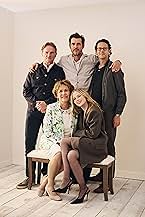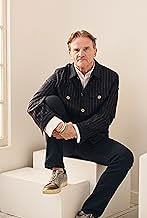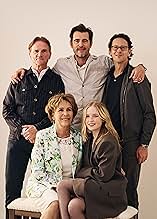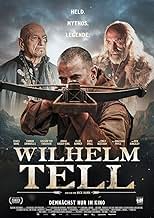A narrativa desenrola-se no século XIV, durante os dias do Sacro Império Romano, onde as nações da Europa disputam ferozmente a supremacia e os ambiciosos austríacos, desejando mais terras, ... Ler tudoA narrativa desenrola-se no século XIV, durante os dias do Sacro Império Romano, onde as nações da Europa disputam ferozmente a supremacia e os ambiciosos austríacos, desejando mais terras, invadem a Suíça, uma nação serena e pastoral.A narrativa desenrola-se no século XIV, durante os dias do Sacro Império Romano, onde as nações da Europa disputam ferozmente a supremacia e os ambiciosos austríacos, desejando mais terras, invadem a Suíça, uma nação serena e pastoral.
- Direção
- Roteiristas
- Artistas
- Direção
- Roteiristas
- Elenco e equipe completos
- Produção, bilheteria e muito mais no IMDbPro
Resumo
Reviewers say 'William Tell' is lauded for its strong performances, stunning cinematography, and historical authenticity. The narrative of rebellion against tyranny resonates, though dialogue and pacing receive mixed feedback. Some find the script theatrical, and the middle section drags. Historical accuracy and character portrayals are debated. Despite these issues, the film's epic scope and emotional depth make it a compelling historical drama.
Avaliações em destaque
Had to turn it off after so many sea voyages which appeared to be made out as a if they were on the North Sea. Between Switzerland and Austria? Awful. While this was dreadful and mind numbing even as a bit of background noise it became too much to cope with. Not sure why reviews have to be so long so again I'll just say don't bother. Walk your dog for the 5th time today go to the toilet, even if you don't need to. You can read the ingredients on the shampoo bottle, It'll be more entertaining even if you know them word for word. Then move onto the shower gell. Enough words almost now. It's awful cheers.
An adaptation of Friedrich Schiller's 1804 play of "Wilhelm Tell" and story of the Swiss struggle for independence. Where an act of oppression, followed by unnecessary wrongdoing sparks a response that sets off a chain of events that lead to rebellion. Wilhelm Tell, master of the crossbow, involved in a conflict he would have rather not be a part of..
Visually, the film delivers beautiful landscape shots and a believable period piece, with a nicely-colored and dynamic cinematography and an excellent production! Not to mention a rather large cast of actors that present the material with strong performances.
I've read questioning of the "dialogue", but as a foreigner, I found it was easy to follow at all times and no line particularly annoying or useless.
But.. despite this strong execution, the script lacks surprises, intrigue and excitement. Making the predictable plot an expected retelling of this known story.
Don't get me wrong, it is quite solid and engaging enough.. but for 2-hour film that feels a tad long, I expected something more. It's not what I wanted it to be, but I would recommend it still to those interested and those not familiar with the famous character.
Visually, the film delivers beautiful landscape shots and a believable period piece, with a nicely-colored and dynamic cinematography and an excellent production! Not to mention a rather large cast of actors that present the material with strong performances.
I've read questioning of the "dialogue", but as a foreigner, I found it was easy to follow at all times and no line particularly annoying or useless.
But.. despite this strong execution, the script lacks surprises, intrigue and excitement. Making the predictable plot an expected retelling of this known story.
Don't get me wrong, it is quite solid and engaging enough.. but for 2-hour film that feels a tad long, I expected something more. It's not what I wanted it to be, but I would recommend it still to those interested and those not familiar with the famous character.
The story is different and they introduced Arab elements into the Catholic and white Switzerland of the Middle Ages, Switzerland did not give women the right to vote until the 1970s, so women fighting in the Middle Ages in Switzerland, come on. Joan of Arc is exceptional.
21st century Switzerland, which has immigrants from the Muslim world from Asia and Africa, was very different in the Middle Ages and Arab warriors certainly did not fight together alongside Crusaders in Switzerland Here they mixed Robin Hood, William Tell, and Peter Pan and created a new story The clothing and hairstyles do not match the period I liked the Crossbow series better.
21st century Switzerland, which has immigrants from the Muslim world from Asia and Africa, was very different in the Middle Ages and Arab warriors certainly did not fight together alongside Crusaders in Switzerland Here they mixed Robin Hood, William Tell, and Peter Pan and created a new story The clothing and hairstyles do not match the period I liked the Crossbow series better.
William Tell is a new action adventure film directed and written by Nick Hamm, director of Driven and The Journey.
In the 14th century, the world is in a mess after the fall of the Roman Empire. Tyrannical rulers try to take as much land as possible and keep it under their control. The Austrian ruler also tries to keep Switzerland under his leadership.
The Swiss farmer William Tell (Claes Bang) helps a fleeing man from the corrupt Austrian power and thus starts a rebellious resistance against this tyranny. In the hope of getting enough support from others, they try to end this situation, in order to start a more fair rule.
Nick Hamm has experience as a director, but for this film adaptation of the Swiss legend of William Tell, he chose to write the story of the film independently for the first time. Unfortunately, he misses the mark, because he ended up with a messy film. Where he does not always seem to have been very clear about where exactly he wanted to go with the story. As a result, the story can sometimes be difficult to follow.
This is also because the film starts at a hurried pace, but then later slows down to a long-winded pace. In the smooth introduction, too many different problems and characters are introduced, most of which have their own storylines. Most of these storylines are more separate from each other and sometimes only overlap briefly, but these overlaps do not always have the same amount of use or real meaning.
You also do not get to know the many characters well enough to really care about most of them during the final battle. When people die during this battle, you do not always know exactly who has died and you also care little about most of the lost fighters.
Most of the fights are also a bit on the hurried, simple side, because William Tell quickly manages to eliminate most of his opponents. This sometimes happens with just an arrow, despite the armor that his opponents wear.
Due to the many, smooth introductions of characters, most actors do not really get a chance to make the characters their own. Some then deliver somewhat weak or exaggerated acting.
In the 14th century, the world is in a mess after the fall of the Roman Empire. Tyrannical rulers try to take as much land as possible and keep it under their control. The Austrian ruler also tries to keep Switzerland under his leadership.
The Swiss farmer William Tell (Claes Bang) helps a fleeing man from the corrupt Austrian power and thus starts a rebellious resistance against this tyranny. In the hope of getting enough support from others, they try to end this situation, in order to start a more fair rule.
Nick Hamm has experience as a director, but for this film adaptation of the Swiss legend of William Tell, he chose to write the story of the film independently for the first time. Unfortunately, he misses the mark, because he ended up with a messy film. Where he does not always seem to have been very clear about where exactly he wanted to go with the story. As a result, the story can sometimes be difficult to follow.
This is also because the film starts at a hurried pace, but then later slows down to a long-winded pace. In the smooth introduction, too many different problems and characters are introduced, most of which have their own storylines. Most of these storylines are more separate from each other and sometimes only overlap briefly, but these overlaps do not always have the same amount of use or real meaning.
You also do not get to know the many characters well enough to really care about most of them during the final battle. When people die during this battle, you do not always know exactly who has died and you also care little about most of the lost fighters.
Most of the fights are also a bit on the hurried, simple side, because William Tell quickly manages to eliminate most of his opponents. This sometimes happens with just an arrow, despite the armor that his opponents wear.
Due to the many, smooth introductions of characters, most actors do not really get a chance to make the characters their own. Some then deliver somewhat weak or exaggerated acting.
I watched the world premiere of William Tell at the Toronto International Film Festival (2024).
The presenter of the festival had said before the movie, "they don't make movies like this anymore". I assumed that was a positive thing.
Unfortunately, it really wasn't. The biggest issue of the movie was the language used.
This is a 14th-century period piece that involved the Swiss and Austrians. But for whatever reason the dialogue was written in something that sounded like a high-schooler's approximation of Victorian English.
According to the director, he wrote the dialogue to have language unique to the film. Maybe to assist in some sense of believability within this world. Instead the film was often hard to follow. Character motivations were lost in the flowery, disjointed language.
That being said - the cast did their absolute best with the film. Golshifteh Farahani, Connor Swindells, Rafe Spall, and Ellie Bamber were standouts.
Don't go to see the film for Ben Kingsley - he was barely in it and his performance felt completely phoned in.
If you're okay with 2-hours of mindlessness as you watch beautiful scenery and cool fight scenes - I think there is enough to enjoy.
The movie set up a sequel. I do hope it can be made, and some changes to how dialogue and character interactions are done will be made.
The presenter of the festival had said before the movie, "they don't make movies like this anymore". I assumed that was a positive thing.
Unfortunately, it really wasn't. The biggest issue of the movie was the language used.
This is a 14th-century period piece that involved the Swiss and Austrians. But for whatever reason the dialogue was written in something that sounded like a high-schooler's approximation of Victorian English.
According to the director, he wrote the dialogue to have language unique to the film. Maybe to assist in some sense of believability within this world. Instead the film was often hard to follow. Character motivations were lost in the flowery, disjointed language.
That being said - the cast did their absolute best with the film. Golshifteh Farahani, Connor Swindells, Rafe Spall, and Ellie Bamber were standouts.
Don't go to see the film for Ben Kingsley - he was barely in it and his performance felt completely phoned in.
If you're okay with 2-hours of mindlessness as you watch beautiful scenery and cool fight scenes - I think there is enough to enjoy.
The movie set up a sequel. I do hope it can be made, and some changes to how dialogue and character interactions are done will be made.
Você sabia?
- CuriosidadesDespite being a national hero in Switzerland, there is no concrete historical evidence that William Tell ever existed.
The earliest written account of the story appears in a 15th-century chronicle called the "White Book of Sarnen", more than a century after the events are supposed to have taken place.
Furthermore, the act of the hero shooting an apple from his son's head stems from the saga of Toko, who was a servant of the Danish King Harald Bluetooth, who died in 985. Likewise, Toko's story was written down more than two hundred years later, in the epic tale "Gesta Danorum".
Many historians view William Tell as a purely legendary figure, though his story was deeply embedded in Swiss national identity by the time of its writing.
- Erros de gravaçãoThe various castles are shown in their modern forms. Specifically, they have a large number of windows. These were all cut several centuries after the period in which the story is set, when castles were no longer required to be fortresses.
- ConexõesVersion of Guillaume Tell et le clown (1898)
Principais escolhas
Faça login para avaliar e ver a lista de recomendações personalizadas
- How long is William Tell?Fornecido pela Alexa
Detalhes
- Data de lançamento
- Países de origem
- Central de atendimento oficial
- Idioma
- Também conhecido como
- Guillermo Tell
- Locações de filme
- Empresas de produção
- Consulte mais créditos da empresa na IMDbPro
Bilheteria
- Faturamento bruto nos EUA e Canadá
- US$ 43.088
- Fim de semana de estreia nos EUA e Canadá
- US$ 26.554
- 6 de abr. de 2025
- Faturamento bruto mundial
- US$ 680.624
- Tempo de duração2 horas 14 minutos
- Cor
- Mixagem de som
- Proporção
- 2.39 : 1
Contribua para esta página
Sugerir uma alteração ou adicionar conteúdo ausente








































